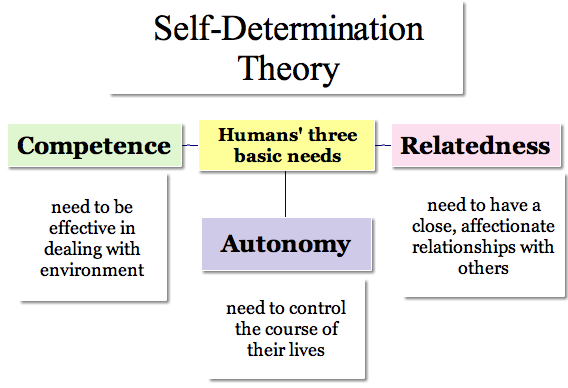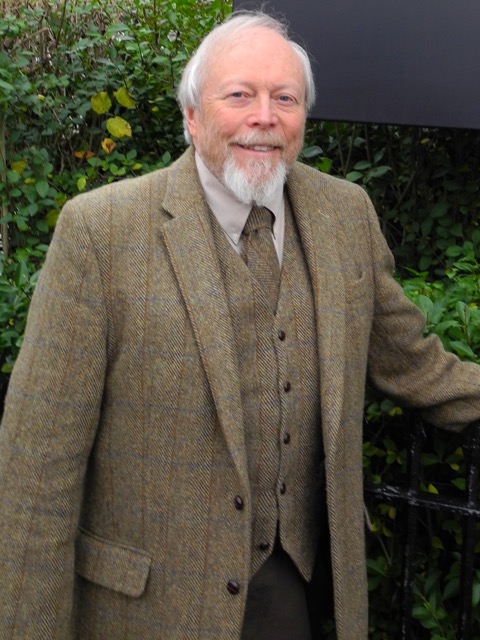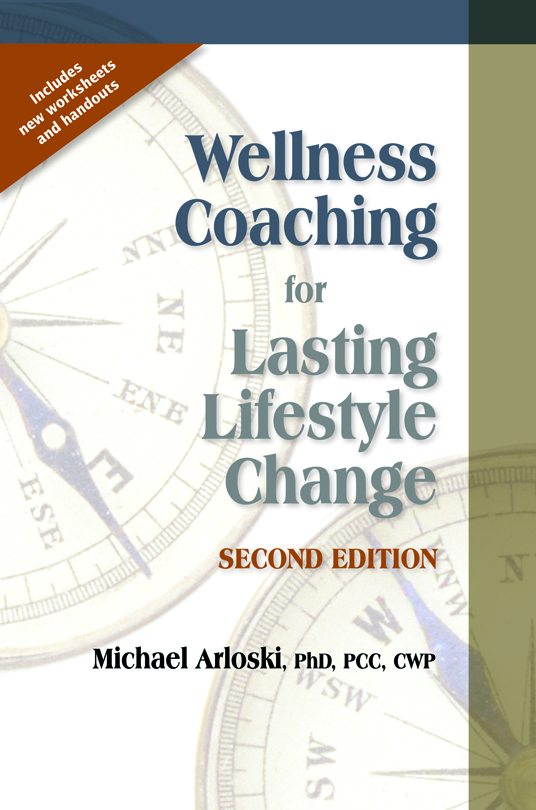The Utility of Self Determination Theory and Motivation in Wellness Coaching – Part Two: Autonomy, Competence & Relatedness

As health and wellness coaches work with their clients to help them live their healthiest lives possible, an understanding of the basics of Self-Determination Theory of Edward Deci and Richard Ryan (http://selfdeterminationtheory.org), is very useful. In the Part One blog posting on this subject we looked at how this theory addresses human motivation. (https://wp.me/pUi2y-nT). Here we will look at how coaches can benefit from understanding the significance of the theory’s identified three innate psychological needs that we all have.

The Three Innate Psychological Needs
At the heart of Self-Determination Theory (SDT) is the underlying assumption that there is an inherent human need for fulfillment and self-actualization through personal growth, development and mastery (competence), for connectedness (relatedness) and for the experience of behavior as self-determined and congruent with one’s sense of self (autonomy). These three needs are considered universal and essential for well-being. Whatever supports the positive experience of competence, relatedness and autonomy promotes choice, willingness and volition, interest, full engagement, enjoyment and perceived value — the inherent qualities of intrinsic motivation. It also leads to higher quality performance, persistence, and creativity.
The degree to which these needs are either supported or compromised and thwarted has a significant impact on both the individual and the individual’s “social context” (the physical and social setting in which people live and work and the institutions with which they interact). If all three needs are satisfied “people will develop and function effectively and experience wellness” and if not, “…people will more likely evidence ill-being and non-optimal functioning.” (http://selfdeterminationtheory.org/theory/)
“We believe that all human beings have a set of basic psychological needs. The needs that we feel are important are the need for competence. That is to say to feel confident and effective in relation to whatever it is you’re doing. Second, to feel relatedness, that is to say to feel cared for by others, to care for others, to feel like you belong in various groups that are important to you. And the third need is autonomy… Human need is something that must get satisfied for optimal wellness and optimal performance. If they don’t get the need satisfied, then there will be negative psychological consequences that follow.”
Coaching In Support of Autonomy
People have a need to feel they are operating their lives out of their own choice. Supporting the client’s need for autonomy is considered one of the primary tasks of a coach. The client-centered nature of coaching supports client autonomy throughout the coaching process. Coaching operates on mutual agreements between client and coach. Agendas are co-created with the client always in the lead. In wellness and health coaching this is especially true as client-generated goals have more inherent “buy-in”, that is, more motivational connection. The coaching cornerstone stance that the client is “naturally creative, resourceful and whole” (NCRW)( https://coactive.com/why-cti/buy-the-book) fosters autonomy as the coach works to evoke the inner wisdom of the client. Rather than operating from an expert point of view, the coach provides support for the client’s own decision making, even though they assist in the process.
Coaching In Support Of Competence
This NCRW stance also supports the other key human need according to SDT, of seeking to achieve competence. Again, in line with the tenets of humanistic psychology and the more recent developments in positive psychology, clients are treated as though they are indeed capable and possessing great potential. The strengths-based, positive psychology nature of coaching emphasizes acknowledging and building upon the client’s attributes and qualities they already possess. A key here is acknowledgement. Client’s often minimize or fail to recognize their strengths and achievements. If their self-efficacy is already low, having been brought down by previous failure experiences, they may tend to overlook what they are accomplishing, or to downplay it. The active listening skill of acknowledgement needs to be used by coach whenever it can be genuinely utilized. As client and coach work on self-determined goals and break it down into doable action steps, leading the client to enjoy more and more successful experiences. As they do so, they begin to feel more competent in the area of improving their lifestyle, which naturally builds their feelings of self-efficacy.
Coaching In Support of Relatedness
 The heart of coaching is the coaching relationship itself. Creating that alliance supplies the client with a trusted resource for support that can be relied upon unconditionally. As the coach exhibits the qualities that make up great coaching presence (supplying the facilitative conditions of coaching) (https://wp.me/pUi2y-6i) the client feels accepted, acknowledged and cared for. Often our clients are lacking relationships in their lives where they experience adequate empathic understanding and are free from judgment.
The heart of coaching is the coaching relationship itself. Creating that alliance supplies the client with a trusted resource for support that can be relied upon unconditionally. As the coach exhibits the qualities that make up great coaching presence (supplying the facilitative conditions of coaching) (https://wp.me/pUi2y-6i) the client feels accepted, acknowledged and cared for. Often our clients are lacking relationships in their lives where they experience adequate empathic understanding and are free from judgment.
“It is important to note that whilst a coachee may have close relationships outside coaching, s/he may not consistently feel heard, understood, valued and/or genuinely supported within those relationships. If not, they are unlikely to feel strongly and positively connected to others and in an attempt to satisfy this basic need, may attempt to connect by acting in accordance with the preferences of others, rather than one’s own.” (https://ro.uow.edu.au/cgi/viewcontent.cgi?referer=https://www.google.com/&httpsredir=1&article=1106&context=gsbpapers)
For the client, it is not only refreshing to relate to someone who provides unconditional positive regard and validates their experience and feelings, it may actually free the client up to explore their lives with new openness and independence. Perhaps they have been holding themselves back from making some of the lifestyle changes they need to make because of the fear of losing connection, to some degree, with others. Perhaps with the support of the coach, the client may be willing to take such risks to live in a healthier way.
The Real Balance approach to coaching has long recognized the importance and power of coaching for connectedness. We realize that coaching is a very brief moment in someone’s life and that lasting lifestyle improvement often hinges upon finding the support of others for the changes clients need to make. As we help our clients choose action steps in their Wellness Plan, we continually ask, Who else can support you in doing this? Building in strategies to seek out and gain support for wellness goals and the action steps needed to achieve them is often critical to success.
Of course, not all of our clients enjoy lives rich in connectedness at home, work and in their communities. As we co-create the Wellness Plan with our clients, we may want to include developing more connectedness as an Area of Focus to be consciously worked on. Part of that process may be exploring ways in which the client holds themselves back from reaching out and making more interpersonal connections in their lives. As clients feel empowered by the autonomous nature of choice in the coaching process, they may be more willing to increase their connectedness.
As coaches reflect upon their work, not only with a single client, but will all of the people they coach, they can benefit from asking themselves if their coaching process addresses and supports the fulfillment of these three innate psychological needs. The self-vigilant coach may want to listen to session recordings and ask themselves “Am I coaching in a way that really supports my client’s autonomy, or am I being too prescriptive or too directive? Am I using acknowledgement enough to help my client realize how their sense of competency is increasing? Am I remembering to ‘coach for connectedness’ and help my client expand their circles of support?"
Deci and Ryan see the fulfillment of these needs as paving the way towards optimal functioning — essentially making the wellness way of life much easier.

For the very best in wellness and health coach training look to REAL BALANCE GLOBAL WELLNESS SERVICES, INC. Over 8,000 wellness & health coaches trained worldwide. http://www.realbalance.com

For more about effective coaching refer to Wellness Coaching For Lasting Lifestyle Change, 2nd Ed., by Michael Arloski, Ph.D., PCC, CWP, NBC-HWC. https://wholeperson.com/store/wellness-coaching-for-lasting-lifestyle-change.shtml and to Your Journey to a Healthier Life (Paths of Wellness Guided Journals) by the same author. https://wholeperson.com/store/your-journey-to-a-healthier-life.shtml









Only registered and logged in readers can leave comments.